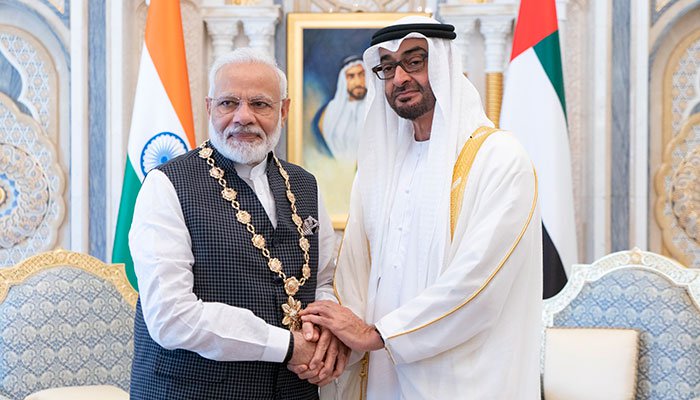UAE awards Modi—a Strategic move to benefit the Muslim World
by Zahack Tanvir
Amicable relations with India brings more benefit to the Arab and the Muslim world, and being defiant brings harm.
UAE Government on Saturday honored Indian Prime Minister Narendra Modi with the highest civilian award aka “Order of Zayed”, however Qatar’s al-Jazeera seems to be upset with the growing UAE-India relations, so a news popped-up in every feed that “India’s Narendra Modi gets top UAE honour amid Kashmir crisis“—a deliberate attempt to ignite an anti-Arab hatred by exploiting the Muslims’ sentiments.
Later, social media posts against Emirati and Saudi governments spawned on the computer screens, and people started passing flippant remarks at the governments without even understanding how these strategic relations between the Arab countries and the Asian countries help build a positive atmosphere for the Muslim and the Arab world.
Highest Civilian Award exclusively for Modi for abolishing Article 370 in Kashmir?
Let’s hammer this in our minds that the Highest Civilian Award is given to the representatives of the countries whose citizens have contributed in the development of a country. It can be Modi or anyone who occupies the seat of the Prime Minister.
In the past, “Order of Zayed” was given to the Crown Prince of Japan Naruhito in January 1995, King of Bahrain Sheikh Hamad al-Khalifah in February 2005, Pakistan’s Pervez Musharraf in January 2007, Russia’s Vladimir Putin in September 2007, England’s Queen Elizabeth II in November 2010, Morocco’s King Mohammed VI in May 2015, King Salman of Saudi Arabia in December 2016, and many more.
The award is not excluded for Modi for the abolition of Article 370 in Kashmir, as the media attempts to paint.
UAE-India Relations
Irrespective of the ruling party whether BJP or Congress—UAE and India have long enjoyed relations vis-à-vis investments in infrastructure, cooperation in renewable energy, cooperation in combating Cyber-crimes, currency exchange, and many other arenas.
In fact, the UAE embassy in New Delhi claims that relationship between UAE and India are deep rooted more than a century.
India-Iran relations Vs. India-UAE relations
In the Saudi-led coalition in Yemen, UAE plays a vital role in combatting the Iran-backed Houthi rebels, and it also plays a major role in lobbying sanctions against Iran to cut the bloodline to the death-squad Iranian militias in Syria, Yemen, Iraq, Lebanon, and other parts of the middle eastern countries.
Since India holds the fourth position as the largest standing military in the world and its arch rivalry against Pakistan can be exploited by Iran—for Pakistan is the closest ally of Saudi Arabia. Iran can possibly capitalize India’s partnership.
Further, India was the last country to cut-off all oil imports from Iran in May after the US-sanctions, which eventually boosted Saudi Arabia’s oil import by 32%.
In fact, during the recent US-Iran escalations in the Gulf waters, Iran seized and attacked the UAE oil-tankers in the Strait of Hormuz, in response to that India deployed its naval ships to confront the Iranian aggression and to guard the Arab oil-tankers.
In this context, amicable relations with India brings more benefit to the Arab and the Muslim world, and being defiant brings harm.
UAE and Kashmir
The widely spoken topic among Muslims is—why UAE honored Modi amidst the Kashmir crisis, and why isn’t UAE ostracizing India by calling off all the business ties.
These remarks are often infantile—for UAE did its level best to mediate and help resolve the Kashmir crisis.
India was the first non-Muslim country to be formally invited as a “Guest of Honor” in the Organization of Islamic Cooperation (OIC) conference held in February—to amicably highlight the Kashmir crisis and build a warm rapport with India to resolve it.
However, India’s former External Minister Shrimati Sushma Swaraj rejected the OIC resolution calling it “strictly internal matter“.
It’s onerous to dictate a country when it openly declares the resolution as an “internal matter”, and any miscalculated step could engender a never-ending strife—which the Muslim world cannot afford at the moment.
The fact that everyone of us has to bear in mind is—resolutions aren’t accomplished with hastiness and aggression, the people of authority hold the far-sightedness to maximize the optimal outcome without gaining new adversaries. What is required of us is—to hold the horses before publishing and circulating the information that can possibly create the atmosphere of instability and animosity in the Muslim ranks.
Zahack Tanvir is a regular blogger and holds diploma in Journalism from London School of Journalism. He tweets under @zahacktanvir.


